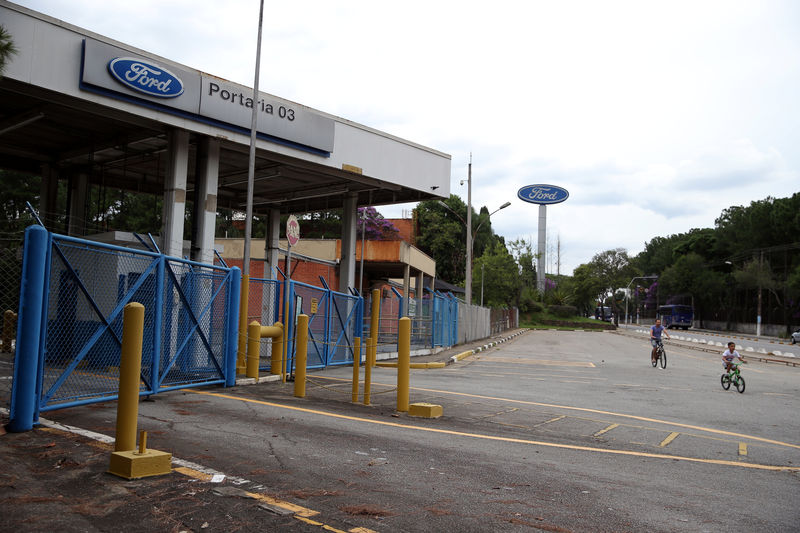By Marcelo Rochabrun
SAO PAULO (Reuters) - Ford Motor (NYSE:F) Co's oldest factory in Brazil, slated for closure later this year, was a giant among auto plants, occupying a sprawling 12 million square feet (111.5 hectares), bigger than many of the automaker's U.S. facilities.
But in terms of spare capacity, the most important indicator of factory profitability, the historic Sao Bernardo do Campo plant, which still employs 3,000 workers, had become a dwarf. Closed more often than it was open, the plant's production lines sprang to life just three days a week.
Ford announced on Tuesday it will close the factory and exit its heavy commercial truck business in South America as part of a global restructuring.
Overall, Ford's Sao Bernardo plant produced 33,000 cars and heavy trucks in 2018, or just 11 vehicles per employee.
An industry rule of thumb says an auto factory struggles to turn a profit unless it uses at least 80 percent of its capacity. In 2018, Ford used 12 percent of its car production capacity at the Sao Bernardo plant. In Brazil as a whole, Ford used 58 percent of its total production capacity last year, leaning heavily on a plant in the northeastern state of Bahia, where it receives significant tax incentives.
Productivity troubles in Brazil are perhaps most severe at Ford but plague the industry as a whole, even as Latin America's largest economy rebounds from its deepest recession ever with double-digit growth in car sales.
General Motors Co (NYSE:GM), now Brazil's sales market leader, produced cars equivalent to 78 percent of its capacity in 2018, up from 56 percent two years earlier, according to Reuters calculations based on capacity figures GM disclosed and production figures from local industry association Anfavea.
Still, GM executives warned workers earlier this year that the company was experiencing "a critical moment" in the country amid heavy losses.
Another top domestic producer, Fiat Chrysler Automobiles NV, produced cars equivalent to just 47 percent of its overall capacity, up from 36 percent in 2016, according to a similar calculation.
Ford's heavy truck business, which will be discontinued in South America, operated at 19 percent capacity, according to Ford's own figures. The company said it could find "no viable path to profitability" for the unit.
"We know Brazil has excess capacity," said Leticia Costa, a Brazilian consultant and auto industry expert. "This is a global problem for the auto industry but it's particularly true for emerging markets."
BOOM DAYS IN BRAZIL
Brazilians' mushrooming disposable income, along with hefty import barriers, encouraged automakers - led by Volkswagen (DE:VOWG_p) AG - to set up shop there and produce cars locally starting in the late 1950s. That turned Sao Paulo's industrial suburb of Sao Bernardo into the epicenter of what for a time was one of the world's top five auto producers.
Volkswagen, whose Beetle was the market's sales leader in the industry's early boom days, did not respond to a request for comment on its capacity.
But the high costs of local production and dependence on what turned out to be a fickle domestic market also sowed the seeds of the industry's hollowing out and dispersal into newer plants in far-flung states. The severe economic recession that began around 2013 hammered local producers. While the industry is recovering, it is still far behind its peak.
But some plants can now build cars more efficiently. Ford's second plant in Bahia produces six times more cars than the Sao Bernardo plant, with 53 percent more workers, according to the company's website.

"Fixed costs at that scale are sky-high," said David Wong, a management consultant and Brazilian auto industry expert.